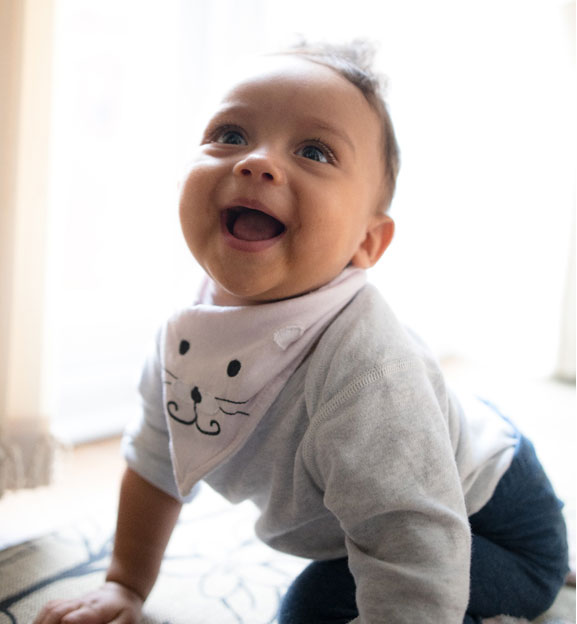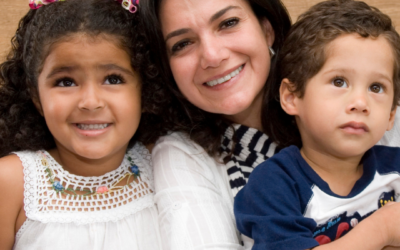Solving Families’ COVID Financial, Housing Crises
Program Update Fall 2020
The coronavirus pandemic’s hardships have tested all of us, and most especially the unstably housed and homeless children and parents served by FamilyAid Boston. While the harsh reality for families who lost jobs and the safety net of school and daycare is disheartening, agency staff have been inspired and driven by donors’ generosity and compassion to lift families up in this great time of need. Private support has helped the agency to respond to this crisis with immediate emergency aid, while still providing critical shelter, housing placements and homelessness prevention.
Families’ need for housing and services has grown tremendously since March, and FAB scaled its programs and partnerships to meet the demand. In the last year, FAB served more than 2,600 children and parents—a 63% increase over the previous year – as a result of the pandemic’s impact. Here are some the incredible outcomes private donor and foundation support has made possible.
Emergency Food, Supplies and Financial Assistance
When the coronavirus hit and the city shut down, FamilyAid stepped up. With no jobs, and no daycare or school supports, most of FAB clients did not have enough food and essential supplies to last even 1 week. Since the outbreak, FamilyAid has been procuring and delivering 3.5 tons of food, supplies (diapers, toiletries, paper products, etc.) and PPE, weekly to over 1,200 children and parents who were already struggling to make ends meet. To date, the agency has delivered more than 100 tons of critical food and supplies to the doors of its clients. Its offices now serve as a warehouse and distribution center. To ensure families’ safety the agency are also:
- Conducting daily or weekly video calls to assess and support clients’ needs and health.
- Providing bi-weekly cash assistance – totaling $250,000 to date – to help families who lost their jobs or experienced a significant reduction in hours, pay their mounting bills.
- Providing rent abatement – $65,000 to date – to all families living in FamilyAid permanent housing.
- Negotiating with clients’ landlords on rent reductions/forgiveness.
The results of these efforts are significant:
- Family food insecurity dropped from 50% in March to 10% in September.
- The number of families who do not have essential supplies has dropped by 65%.
While FAB is making progress, the agency still has much more to do to eradicate families’ food and supply insecurity and reduce their high stress levels as the pandemic drags on.
Continued support will allow us to maintain and expand these critical services, until the worst of the pandemic passes, and families are secure in their jobs and housing.
Expansion of Prevention Programs
For 30 years, FamilyAid Boston’s Homelessness Prevention programs have been providing children and parents at imminent risk of homelessness with crisis intervention, emergency funds and ongoing support services to stabilize their housing and establish long-term stability. In the fall of 2019, FAB launched a new pilot program with Boston Public Schools (BPS) to identify families experiencing housing instability earlier—before an eviction occurs– and intervene with low-cost, highly effective services.
- The original goal was to enroll 400 family members in the first year, but demand has increased to nearly 1,800 children and parents since the pandemic’s outbreak.
- In April, the Mayor’s office made 500 low income housing vouchers available to BPS families living in unstable situations. In a testament to its strong partnership and impressive housing placement rate, BPS asked FamilyAid to manage the complex assessment, application and housing search and placement process.
- FamilyAid’s BPS prevention program is the subject of a new Boston College-United Way research study that will help create a replicable and scalable model that will be shared widely and ultimately lead to policy changes to reduce family homelessness.
In late June, FAB launched a second prevention program with Boston Children’s Hospital’s Martha Eliot Community Health Center. And this month, it expanded the program to Boston Medical Center. As a result of the pandemic, these effective pilot programs have placed FamilyAid at the center of the city’s response to a growing wave of family homelessness.
Client Spotlight
Carmela, a client who was referred to FamilyAid’s prevention program through her 15-year-old daughter’s school, had never been dependent on external support—until she was involved in a car accident that left her unable to work. Despite her medical bills and her daughter’s health problems, Carmela was able to eke out rent for their apartment. The pandemic’s resulting closure of other community resources complicated matters. With more bills to pay and having to choose between food and rent, Carmela was on verge of moving into the streets. With FamilyAid donor- funded rental assistance and emergency food/supplies, Carmela’s situation was quickly stabilized. She was able to pay her rent, and with support from FamilyAid, found a telemarketing job that she could do from home. Now able to manage through the pandemic, Carmela is deeply grateful for FamilyAid’s support: “Just when I thought my daughter and I would end up on the street, FamilyAid stepped in and helped us get back on our feet. They don’t judge you; they just work with you and help with what you need.”
Through private support, FAB is making significant strides in the fight against family homelessness, but the economic situation for its clients–and countless others—is dire. A new study from the Harvard T.H. Chan School of Public Health finds that:
- 61% of US households with children, report facing financial problems during the coronavirus outbreak.
- More than one-third of households with children, report serious problems keeping their children’s education going during the outbreak.
The need for FAB’s services continues to grow, and the agency remains reliant on – and grateful for – donor’s support. In the coming year FamilyAid will:
- Support an increasing number of families with basic humanitarian relief.
- Support an increasing number of children and parents with prevention services through BPS, Children’s Hospital and Boston Medical Center.
- Expand much-needed children’s supports to address/alleviate the physical and emotional trauma associated with housing instability.



